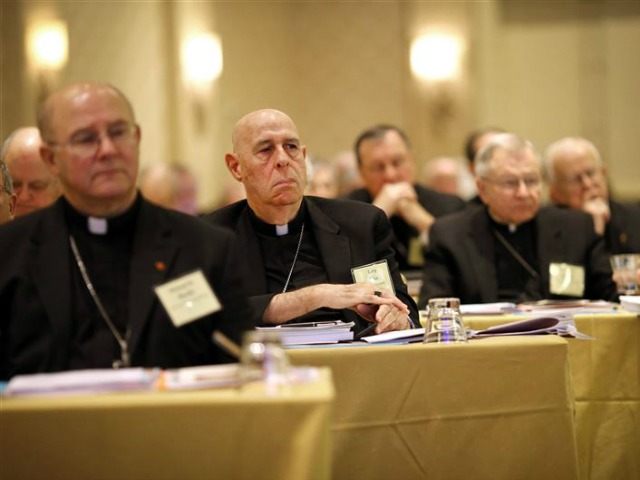In a full-court press, liberal Catholic media are trying to push the U.S. bishops to amend their election guidelines to focus more on care for the poor and immigration than issues such as same-sex marriage, abortion and religious liberty.
The U.S. Bishops are meeting now in Baltimore, and for the moment seem determined to stay the course, insisting especially on issues such as religious liberty and man-woman marriage.
The Bishops’ election guide, called “Faithful Citizenship,” outlines Catholic teaching on a number of issues that affect policy decisions and is meant to provide orientation to Catholics when they enter the voting booth. It also suggests the relative importance of certain issues vis-à-vis others.
The first two “serious moral questions” dealt with by the Bishops’ guide are abortion and religious liberty, insisting that Catholics must resist the “continuing destruction of unborn children through abortion” and to oppose “efforts to force Catholic ministries—in health care, education, and social services—to violate their consciences or stop serving those in need.”
Leaders within the liberal camp, who universally side with the Democratic Party, are doing their best to convince the Bishops to adjust the focus of their document to reflect a different set of issues more in consonance with their own agenda.
One of the key strategies they have adopted is to make the bishops look like “bad Catholics,” since they supposedly do not follow the initiatives and emphases of Pope Francis.
The liberal Jesuit sociologist Father Thomas Reese, for instance, has sought to pit the U.S. Bishops against Pope Francis, with the provocative article titled “Francis’ priorities vs. the priorities of the U.S. bishops.”
Reese asks whether the bishops’ priorities will “sync with those of Pope Francis or will the bishops continue on as if the pope is not taking the church in a new direction?”
Rather than protection for the unborn, the defense of marriage, support for religious liberty and evangelization, Reese says that a more Francis-friendly set of priorities would focus on five issues: the poor, mercy and compassion, synodality, the end of clericalism and the protection of the environment.
Reese seems to have forgotten that the Pope’s first major teaching document was on evangelization, and that two of topics he referenced most often in his recent U.S. trip were the defense of unborn human life and religious freedom.
In a similar vein, the leftward-leaning journalist David Gibson has written that in their annual meeting the nation’s bishops are “still struggling to figure out how much they can, or want, to adapt their priorities to the new marching orders Pope Francis gave them during his historic U.S. visit in September.”
Regarding the reform of the Bishops’ voting guidelines, Gibson lamented that a committee charged with doing a “light revision” of the document “did little to shift the past priorities to emphasize issues the pope highlighted, such as economic injustice and immigration.”
The new draft, he wrote, “doubles down on hot-button topics such as opposition to gay marriage, which the U.S. Supreme Court legalized in a close ruling last June.”
Gibson curiously omits the Pope’s forceful language against that very Supreme Court decision just two months ago.
It was in Philadelphia, which Francis called the “highlight of the trip,” where the pontiff uttered his sternest words, in warning that marriage had been so stretched and distorted in the United States, that it is no longer even similar to the Christian sacrament of matrimony.
The pontiff noted the “unprecedented changes” taking place in contemporary society, “with their social, cultural – and sadly now juridical – effects on family bonds,” referring to the Supreme Course decision in June to impose same-sex marriage on the entire nation in Obergefell v. Hodges.
“These changes affect all of us, believers and non-believers alike,” he said in a blunt address to U.S. bishops.
“Until recently,” the Pope said, “we lived in a social context where the similarities between the civil institution of marriage and the Christian sacrament were considerable and shared. The two were interrelated and mutually supportive.”
“This is no longer the case,” he said.
The basic problem with these journalistic efforts is the underlying supposition that the Catholic Church is like a merry-go-round with no consistent teachings on what it believes, what is important or how citizens should conduct themselves. They seem unable to realize that the Church under Francis is substantially the same as the Church under Pope Benedict or Pope John Paul II.
And no matter how they stretch and massage the Church’s teaching, there is no way to reconcile it with the anti-life, anti-marriage agenda of the Democratic Party.
The Catholic Church is chaplain to no party or political agenda, and there are plenty of differences between Catholic teaching and the position of certain Republican candidates. Nonetheless, on the fundamental moral issues that matter most to Catholics, the Democratic Party has systematically distanced itself from believers.
No amount of tweaking will change that.
Follow Thomas D. Williams on Twitter @tdwilliamsrome

COMMENTS
Please let us know if you're having issues with commenting.